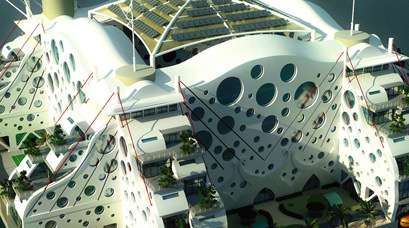Seasteaders Meet Honduran ZEDErs in San Francisco to Discuss the Future of Competitive Governance
As I wrote the other day, and contra Wired magazine's attempt to write it off, the core Seasteading dream of trying to make new lands with new rules is far from dead. In fact, that experimental impulse is also far from restricted to Seasteading per se, as the same sense of the need for competitive governance is also behind another process-in-progress I've reported on here at Reason, the effort to create zones in Honduras with different legal systems from the rest of the country to kick-start, ideally, economic growth in a desperately poor and troubled nation.

They are currently known as "zones for economic development and employment," or ZEDEs. (See many Reason stories on the Honduran experiment.)
It was announced today that the Seasteading Institute is bringing Honduran President Juan Orlando Hernandez to San Francisco to speak about their mutual interests in competitive governance. From the Seasteaders:
Honduras has enacted the boldest legislation of any nation in recent history, effectively opening a new jurisdictional frontier. Zones for Economic Development and Employment, (ZEDEs) will be developed with entirely new governmental systems, fostering a market of governance bodies competing to attract residents.
The event will feature:
- Juan Orlando Hernández, President of Honduras
- Randolph Hencken, Executive Director of The Seasteading Institute
- Moderator Guillermo Peña Panting, Executive Director of The Eleuthera Foundation
Learn about the unprecedented opportunities in ZEDEs, and expect a major announcement.
Randolph Hencken, Executive Director of the Seasteading Institute, observed, "The unifying trait of seasteaders is a desire to abandon pointless arguments over how government ought to operate, and work together on creating new zones for experimentation to actually demonstrate which systems of government work best."
The event is Monday June 8 at 6 p.m. at Galvanize, 44 Tehama St, San Francisco, CA 94105, and you can register at this link.
Editor's Note: As of February 29, 2024, commenting privileges on reason.com posts are limited to Reason Plus subscribers. Past commenters are grandfathered in for a temporary period. Subscribe here to preserve your ability to comment. Your Reason Plus subscription also gives you an ad-free version of reason.com, along with full access to the digital edition and archives of Reason magazine. We request that comments be civil and on-topic. We do not moderate or assume any responsibility for comments, which are owned by the readers who post them. Comments do not represent the views of reason.com or Reason Foundation. We reserve the right to delete any comment and ban commenters for any reason at any time. Comments may only be edited within 5 minutes of posting. Report abuses.
Please to post comments


Not to be a fussbudget, but why can't they come right out and say "no environmental laws, no labor laws, safety laws and no basic human rights for anyone worth less than $500,000"? or, at least, "we want to be like Quatar and Dubai".
Probably the same reason millions of Mexicans/Central-South Americans aren't illegally moving to Qatar and Dubai but instead of here.
They don't want that, they want free stuff and comparatively high paying (compared to their home countries) heavily regulated jobs
And the whole not crossing an ocean thing. You really are underestimating how much proximity makes a difference in where people immigrate.
Jer,
Poor countries in Central and South America face routine corruption and economic mismanagement. ZEDE is simply a more desperate version of our economic developement zones. They know that Americans (their cash crop of naive investors, right nearby) fear confiscatory foreigners who will lure them in with promises and then have their investment as a hostage to being sucked dry by the local version of vampiristic gov thirst for cash.
So its:
'We need educated, wealthy, job creators and spenders, not more poor people we need to feed. Even if we can't soak you with taxes, you bring entrepreneurship and the purchase of some local commodities, land, and the direct employement of some local labor. So we will benefit, even if we forgo tax revenue."
Dubai? They inherit the slave accepting culture of the Ottomans and previous Islamic and non Islamic societies, which is still active in Arabia and northeast Africa, only much less openly than it was only a few decades ago. So the abusive handling of poor foreign contract labor, and selling citizenship for half a mil or more fits into their culture well. We have a similar quick green card system for a big investment, and the Bahama's will give you citizenship for the purchase of a minimum of a $500,000 property. The idea of welcoming the fairly to very wealthy is hardly evil. Dubai is only on the bad side due to its very recent (and like several Arab countries, strongly suggestive of current) slavery and very bad labor practices.
'Steaders and ZEDErs!
Hopefully they have the option of no governance whatsoever. "Entirely new governmental systems" doesn't solve the problem that is gov't.
It will be interesting to see if private defense will be "allowed".
I would like to see that too, but private defense is likely a big no-no. It would scare the shit out of host countries for ZEDEs and any but the most radical steaders would be apprehensive. Peter Thiel would probably not mind from the impression I get after reading about him (not afraid of weapons and invests in defense contractors) and his relationship with Cody Wilson, but other investors may balk at that.
Governance and government aren't necessarily the same thing. You can have governance without taxation and state monopolized law systems.